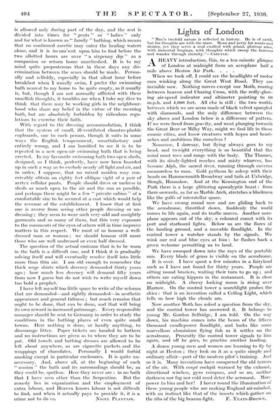Lights of London
"Man's twofold nature is reflected in history. He is of earth, but his thoughts are with the stars. Mean and petty his wants and desires, yet they serve a soul exalted with grand, glorious aims, with immortal longings, with thoughts which sweep the heavens and wander through eternity."—Cmittxtx.
AHEAVY introduction, Ibis, to a ten-minute glimpse of London at midnight from an aeroplane half a Mile above Heston Air Park. . . .
When we took off, I could see the headlights of motor ears winking along the Great West Road. They are invisible now. Nothing moves except our Moth, roaring between heaven and Charing Cross, with the redly-glow- ing air-speed indicator and altimeter pointing to 80 m.p.h. and 4,000 feet. All else is still : the two worlds between which we are seem made of black velvet spangled with diamonds, and the only difference between the sky above and London below is a difference of pattern. If we were freed from gravity, and went plunging towards the Great Bear or Milky Way, might we find life in those cosmic cities, and know creatures with hopes and heart- aches and ambitions like ourselves ?
Nonsense, I daresay, but flying always goes to my head, and to-night everything is so beautiful that the mind must rove and range with the body. The Thames, with its dimly-lighted reaches and misty wharves, has become Alph, the sacred river, running through caverns measureless to man. Gold pythons lie asleep with their heads on Hammersmith Broadway and tails at Uxbridge, Slough, Hounslow. And at the Kensington end of the Park there is a large glittering apocalyptic beast : from there onwards, as far as Marble Arch, stretches .a blackness like the gulfs of interstellar space.
• We have swung round now and are gliding back to the aerodrome, throttled down. Suddenly the world comes to life again, and its traffic moves. Another aero- plane appears. out of the sky, a coloured comet with its port and starboard lights. Below us are the flares of the landing ground, and a movable floodlight. In the control tower a watcher stands by the .signals. We wink our red and blue eyes at him : he flashes back a green welcome permitting us to land.
We have swooped down into the rays of the portable sun. Every blade of grass is visible on the aerodrome.
It is over. I have spent a few minutes in a fairyland such as I have not found for thirty years. People are sitting round braziers, waiting their turn to go up ; and others arc eating kippers in the restaurant. It is close on midnight. A cheesy looking moon is rising over Harrow. On the control tower a searchlight probes the skies : that is an invention called a Ceiling Light, which tells us how high the clouds are.
Now another Moth -has asked a question from the sky, and the control tower has answered it. It belongs to young Mr. Gordon Selfridge, I am told. On the way down, his machine comes into the beam of the fifteen thousand candlepower floodlight, and looks like some marvellous . aluminium flying fish as it settles on the aerodrome. Presently the control tower signals to bins again, and off he goes, to practise another landing.
A dozen young men and women are learning to fly by night at Heston ; they look on it as a quite simple, and ordinary affair—part of the modern pilot's training. And so it is. Many inventions have conquered the old terrors of the air. With coupe cockpit warmed by the exhaust, directional wireless, gyro compass, and so on, neither darkness nor fog nor cold need deter the aeronaut. More power to him and her! I hover round the illumination of these young people who are making England air-minded, with an instinct like that of the insects which gather on the ribs of the- big beacon-light. F. -YEATS-BROWN,


































 Previous page
Previous page